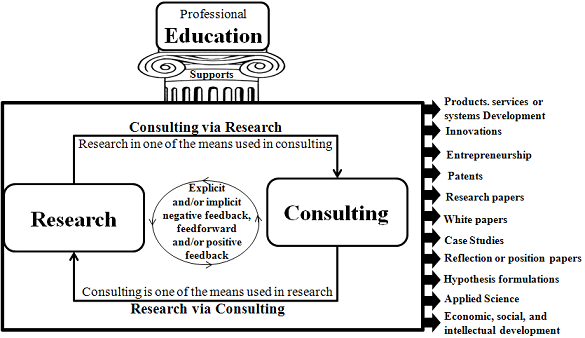|
Some academic areas necessarily require consulting activities or other related practicing experience, especially if a research leads to development or a real life problem solving requires research. For example, what would be the "lab" (as a means for development) for a professor of information systems development methodologies if not information systems development in the real world? In some other academic fields, consulting activities might enrich, support and enhance research as it might be the case of some engineering fields, law, medicine, managements science, operation research, etc. Still, in other academic fields consulting is perceived as a distracting activity from what is considered to be a scholarly research. In some fields or disciplines this might be true, but even in these cases, scholarly research would eventually generate, via other scholars or researchers, applied research which would support real life problem solving and, consequently, decision and policy making processes which form part of the consulting activities. It is well known that research activities in many academic departments go on because of grant monies received to development. Consequently, in such cases, to cybernetically relate research and consulting might produce the desired development (see figure below).
Research*, development and consulting** are, directly or indirectly, immediately or mediately, related and complemented each other via cybernetic co-regulative loops (negative feedback or feedforward) and co-amplificatory loops (positive feedback) which, in turn, might potentially produce synergic effects that a) increase the effectiveness (and possibly the efficiency) of both kinds of activities, and/or b) generate systems/products development, innovations, entrepreneurship, patents, research papers, etc. On the other hand, this kind of systemic-cybernetic relationships between research and consulting provides the type of experience required for a real education, i.e. the kind of experience (techne) which combined with knowledge (episteme) is required for a real Higher Education and not mere Higher Instruction. Within professional careers is where this kind of experience is mostly needed in an authentic education.
(* We are referring to financially supported research (via grants, salaries, etc.) and non-financially supported ones. ** We are referring to for-profit, not-for-profit, and pro bono consulting activities.

The epistemological component of Education is the "engine" that drives research (knowledge production) through consulting to yield the techne (development of products, services, etc.) to produce innovations, patents, case studies, etc. And vice versa, consulting is one of the engines of research oriented to real life problem solving. Consequently, research via consulting and consulting via research complement (or should complement) synergistically each other in order to adequately integrate academic activities to Society at large and to support Higher Education processes.
Purpose of R&C 2023
According to the short motivation given above, the objectives of the Organizing Committee is to bring together researchers and consultants, academics and professionals: 1) who have been doing, implicitly or explicitly, research via consulting or consulting via research, or 2) who have been researching or reflecting about the relationships between research and consulting, or 3) have been engaged in the organization, design and implementation of academic, not-for-profit, or for-profit organizations oriented to relate research and consulting in order to generate the synergies from which both activities will be benefiting. An increasing number of organizations of this kind are being designed and implemented by universities around the globe. Each of these organizations is an innovation in this area and required entrepreneurial spirit and activities to conceive and implement them.
Who is encouraged to participate in R&C 2023?
This event is especially (but not uniquely) oriented to the following academics, researchers, and professionals or consultants:
- Those who participated in the design, implementation, and/or administration of organizations of "Research and Consulting."
- Those who have been working in organizations of "Research and Consulting", or have done an ad hoc work in some of them.
- Those academics who have done research via consulting
- Those consultants who have done consulting via research
- Those who have experience and/or knowledge to share regarding the relationships between research and consulting.
Ways of participating in R&C 2023
An academic, researcher, professional, or consultant might participate in R&C 2023 by submitting a contributed article which, if accepted, will be included in the conference program. This article might be:
- A research and/or a reflection paper regarding the relationships between research and consulting.
- A case study, or the description of a specific case in which research was done via consulting or consulting was done via research. Such a case can be related to any of the topics of the collocated events and conferences.
- A position paper regarding the participation of university faculties in research via consulting or consulting via research.
- An article regarding the conception, design, and/or the implementation of an organization oriented to "research and consulting".
- An article describing the different legal and structural forms in which an organization of research and development has been integrated into an academic context in order to synergistically relate the academic organization to the private and public sector and, in general, to Society.
- An article describing a seminar delivered in the private or public sector that generated other kind of consulting activities, hypothesis formulation, new reflections, new research, case studies, etc.
Future research, reflections, and/or steps
In the following pairs of activities:
- Research - Consulting
- Research - Development
- Science - Technology
- Science - Engineering
- Theory - Practice
- Education - Training
- Teaching - Instruction
- Episteme - Techne
One may be regarded as contradicting each other while in reality they complement each other as, probably, polar opposites. Each pair of these terms may be regarded as a teeter-totter, one balanced with the other. That teeter-totter may be regarded as a system that needs each to make it whole. In essence, one cannot exist without the other. Science gives technology its identity. There must be theory for there to be practice. To have development, there must be research, and so forth. On the broader philosophical level, episteme (knowledge) expresses itself through techne (craftsmanship). These dichotomies are an exhibition of a deeper structure of consciousness that is within all of us; we are the fulcrum and we present that to the world in consultation. Each pair is constituted by polar opposites, not contradictory opposites as sometimes are taken. As polar opposite they necessarily require and include each other, while contradictory opposites necessarily exclude each other. Consequently, explicit cybernetic relationships between them might generate mutually beneficially synergic effect. This is why we strongly recommend research and reflections regarding the relationship of each pair. See for example, the cybernetic relationship between science and engineering in Callaos, N. 2013, The essence of Engineering and Meta-Engineering, posted at https://www.iiis.org/Nagib-Callaos/Engineering-and-Meta-engineering/, and translated to Japanese; and "Theory and Practice in Research and development" (Teoría y Práctica en la Investigación y el Desarrollo"), chapter 9, pp. 287-332, in Callaos, 1995, Metodología Sistémica de Sistemas posted at http://159.90.80.55/tesis/000077222.pdf
Among the first steps, there will be at R&C 2023 workshops and/or organizational (informal) meetings to create an entity that acts as an umbrella for participants (individuals and organizations) to be in an atmosphere where their research and consulting will be more successful in bearing the productive fruit of their epistemic efforts.
Important Information for your Submissions to R&C 2023
Virtual Participation
Submissions for Face-to-Face or for Virtual Participation are both accepted for the conference. Both kinds of submissions will have the same reviewing process and the accepted papers will be included in the same proceedings, and will have the same selection process for the best papers to be published in the Journal with no additional charge.
Virtual Sessions
Face-to-face sessions of all jointly organized events will have associated virtual pre- and post-conference sessions where registered participants can comment each paper in a forum associated to it. Registered participant at any event will have a password to access any virtual session of any collocated event. Consequently, sessions papers can be read before the conference, and authors presenting at the same session can interact three days before and during the conference, as well as up to three weeks after the conference is over. Authors can also participate in peer-to-peer reviewing in virtual sessions.
Reviewing Process
All Submitted papers/abstracts will go through three reviewing processes: (1) double-blind (at least three reviewers), (2) non-blind, and (3) participative peer reviews. Final acceptance depends of the three kinds of reviews but a paper should be recommended by non-blind reviewers AND blind reviewers in order to be accepted for presentation at the conference and to be included in the respective conference proceedings. A recommendation to accept made by non-blind reviewers is a necessary condition, but it is not a sufficient one. A submission, to be accepted, should also have a majority of its double-blind reviewers recommending its acceptance. This double necessary conditions generate a more reliable and rigorous reviewing than a those reviewing methods based on just one of the indicated methods, or just on the traditional double-blind reviewing. More details regarding this issue can be found at www.iiis.org/peer-reviewing.asp.
The three kinds of reviews mentioned above will support the selection process of those papers/abstracts that will be accepted for their presentation at the conference, as well as those to be selected for their publication in JSCI Journal. Details regarding the Acceptance Policy can be found at www.iiis.org/acceptance-policy.asp.
Comments and evaluations of the reviewers
Authors of accepted papers who registered in the conference can have access to the evaluations and possible feedback provided by the reviewers who recommended the acceptance of their papers/abstracts, so they can accordingly improve the final version of their papers. Non-registered authors will not have access to the reviews of their respective submissions.
Invited Sessions Organizers
Registration fees of an effective invited session organizers will be waived according to the policy described in the web page (click on 'Invited Session', then on 'Benefits for the Organizers of Invited Sessions'), where you can get information about the ten benefits for an invited session organizer. To propose the organization of an Invited Session, please visit the conference website, and go to the menu option "Invited Sessions" and then to the menu sub-option "Invited Sessions Organizers."
Best Papers
Authors of the best 25%-30% of the papers presented at the conference (included those virtually presented) will be invited to adapt their papers for their publication in the Journal of Systemics, Cybernetics and Informatics (JSCI).
One best paper of each session included in the program will be selected by the respective session's co-chairs after consulting with the session's audience. Invited Sessions organizers will select the best paper of the session they organized. If there is a tie in a given session, the paper that will be selected as the best session's paper will be the one which have had the highest quantitative evaluations average according to its double-blind and non-blind reviews.
The selection process of the best 25%-30%, to be also published in the Journal, will be based on the sessions' best papers and the quantitative evaluation average made by its anonymous and non-anonymous reviewers. The later will be applied to papers which acceptance was based on reviews made to draft papers. Reviews of abstracts and extended abstracts will not be valid for selecting best papers according to the quantitative evaluation of the respective submissions.
|

